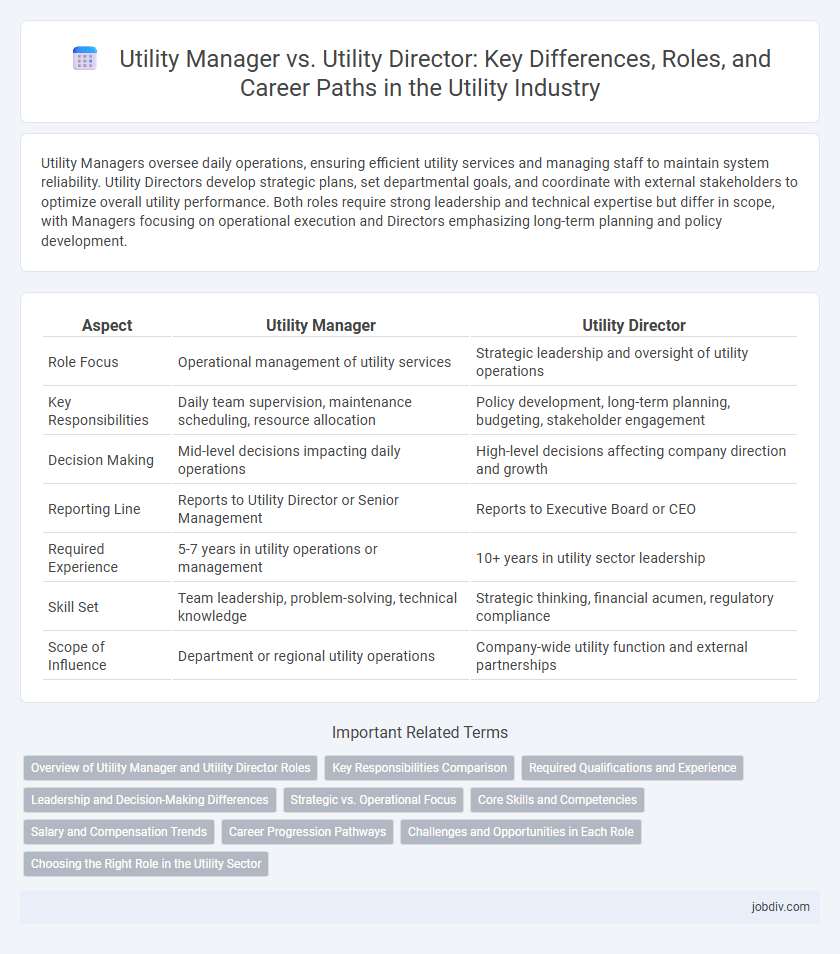Utility Managers oversee daily operations, ensuring efficient utility services and managing staff to maintain system reliability. Utility Directors develop strategic plans, set departmental goals, and coordinate with external stakeholders to optimize overall utility performance. Both roles require strong leadership and technical expertise but differ in scope, with Managers focusing on operational execution and Directors emphasizing long-term planning and policy development.
Table of Comparison
| Aspect | Utility Manager | Utility Director |
|---|---|---|
| Role Focus | Operational management of utility services | Strategic leadership and oversight of utility operations |
| Key Responsibilities | Daily team supervision, maintenance scheduling, resource allocation | Policy development, long-term planning, budgeting, stakeholder engagement |
| Decision Making | Mid-level decisions impacting daily operations | High-level decisions affecting company direction and growth |
| Reporting Line | Reports to Utility Director or Senior Management | Reports to Executive Board or CEO |
| Required Experience | 5-7 years in utility operations or management | 10+ years in utility sector leadership |
| Skill Set | Team leadership, problem-solving, technical knowledge | Strategic thinking, financial acumen, regulatory compliance |
| Scope of Influence | Department or regional utility operations | Company-wide utility function and external partnerships |
Overview of Utility Manager and Utility Director Roles
Utility Managers oversee daily operations, ensuring efficient resource allocation and compliance with regulatory standards in water, electricity, or gas services. Utility Directors provide strategic leadership, guiding long-term planning, policy development, and financial management to align utility services with organizational goals. Both roles require strong expertise in infrastructure management, regulatory frameworks, and stakeholder communication to maintain reliable and sustainable utility operations.
Key Responsibilities Comparison
Utility Managers oversee daily operations, ensuring efficient service delivery, managing staff, and maintaining infrastructure integrity. Utility Directors hold broader responsibilities including strategic planning, budget oversight, regulatory compliance, and long-term system development. Directors also coordinate with government agencies and key stakeholders to align utility services with community goals and regulations.
Required Qualifications and Experience
Utility Managers typically require a bachelor's degree in engineering, business administration, or environmental science, along with 5-7 years of experience in utility operations or management. Utility Directors generally demand advanced qualifications such as a master's degree in public administration or engineering and over 10 years of progressively responsible experience in utility management. Both roles necessitate strong leadership skills, regulatory knowledge, and expertise in budgeting and project management within the utility sector.
Leadership and Decision-Making Differences
Utility Managers oversee daily operations and ensure efficient resource allocation, focusing on tactical problem-solving and immediate team leadership. Utility Directors set strategic goals, drive long-term planning, and make high-impact decisions influencing company-wide utility management policies. Leadership at the director level emphasizes vision-setting, cross-departmental coordination, and stakeholder engagement for sustainable utility performance.
Strategic vs. Operational Focus
Utility Managers primarily concentrate on operational efficiency, overseeing daily functions such as resource allocation, maintenance scheduling, and compliance with safety standards to ensure uninterrupted service delivery. Utility Directors adopt a strategic focus, developing long-term plans, budgeting for infrastructure investments, and aligning utility services with broader organizational goals to drive sustainable growth. The distinction lies in Utility Managers managing immediate operational needs while Utility Directors steer utility organizations toward future objectives and innovation.
Core Skills and Competencies
Utility Managers excel in operational efficiency, team leadership, and regulatory compliance, ensuring daily utility services run smoothly. Utility Directors emphasize strategic planning, financial oversight, and stakeholder engagement, driving long-term utility infrastructure development. Both roles require strong communication skills, problem-solving abilities, and knowledge of utility regulations, but the Director typically holds broader executive responsibilities and vision.
Salary and Compensation Trends
Utility Directors generally earn higher salaries than Utility Managers due to greater responsibilities and strategic oversight, with average salaries ranging from $120,000 to $180,000 annually for Directors compared to $80,000 to $130,000 for Managers. Compensation trends in the utility sector reveal increasing bonuses and performance incentives tied to regulatory compliance and efficiency improvements, reflecting the growing complexity of utility operations. Market demand for experienced leadership in renewable energy integration and smart grid technologies continues to drive upward salary adjustments for both roles.
Career Progression Pathways
Utility Managers typically oversee daily operations and coordinate project teams, serving as a crucial link between field staff and senior management. Progressing to Utility Director roles often requires extensive experience in strategic planning, regulatory compliance, and stakeholder relations, emphasizing leadership and organizational vision. Career advancement from Manager to Director involves developing expertise in budgeting, policy development, and long-term infrastructure management within utility services.
Challenges and Opportunities in Each Role
Utility Managers face daily operational challenges such as coordinating maintenance schedules, ensuring regulatory compliance, and managing team performance to maintain service reliability. Utility Directors tackle strategic challenges including long-term infrastructure investment, policy development, and aligning utility goals with broader organizational objectives. Opportunities for Utility Managers lie in honing technical expertise and leadership skills, while Utility Directors benefit from shaping industry innovation and driving sustainability initiatives.
Choosing the Right Role in the Utility Sector
Choosing the right role in the utility sector depends on the scope of responsibilities and leadership level, with Utility Managers focusing on overseeing daily operations, ensuring compliance, and managing teams for efficient service delivery. Utility Directors hold a more strategic position, responsible for long-term planning, budget allocation, and aligning utility services with organizational goals and regulatory requirements. Understanding these distinctions helps organizations align talent with operational needs and growth objectives in water, energy, or waste management utilities.
Utility Manager vs Utility Director Infographic

 jobdiv.com
jobdiv.com